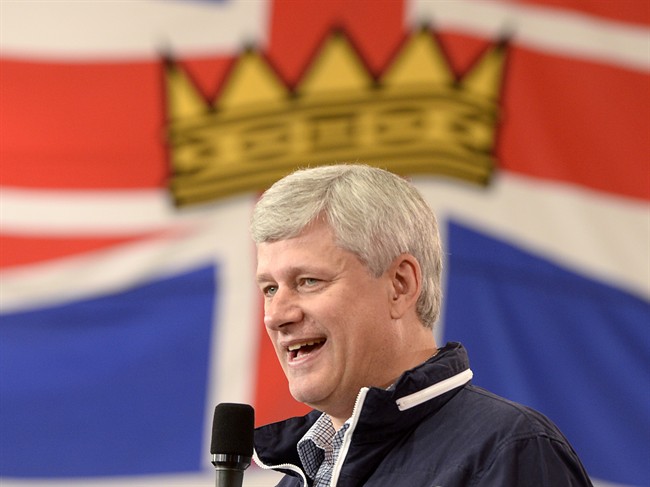VANCOUVER — Federal Conservative Leader Stephen Harper may have opened a new battlefront with Alberta’s NDP premier.

After a campaign announcement Tuesday in North Vancouver, Harper said Alberta has fallen deeper into recession since Premier Rachel Notley was elected in the spring.
“We know why there’s a recession. It’s not because the (federal) government ran a $2-billion surplus. There’s a recession because oil prices have fallen by half,” Harper said.
“And the recession has been made worse because the NDP government came in and followed up by raising taxes on everybody.”
Alberta’s finance minister, Joe Ceci, called Harper’s comments “misleading and inaccurate.” He issued a statement on Wednesday.
“Mr. Harper is well aware that our province is not immune to the impacts of the global markets and the dramatic drop in oil prices. He even stated on August 11: ‘The new NDP government here in Alberta cannot be blamed for the fall in oil prices. They do not control that any more than we do.’
“Clearly, the global drop in oil prices has put a strain on families here in Alberta and across Canada. The Conservative government’s failure to diversify our economy and save in good times means that we’re forced to play catch up in more difficult times.
“Alberta has a significant tax advantage over all other provinces and our new tax rates are now comparable to those in all other Canadian provinces. It is also misleading and inaccurate for him to suggest that these measures will have some special effect in Alberta they do not have elsewhere.
“What has been unhelpful to the overall Canadian economy is the economic record of the current Conservative government.

Get breaking National news
“The current government in Ottawa has the worst job creation record of any federal government since World War II. It ran straight deficits for almost a decade. It added $150 billion to the national debt. It failed to fix our infrastructure deficit. It failed to act credibly on the environment — a fact which has had numerous negative effects on our economy, including a complete failure to secure important access to tidewater for Alberta’s energy producers.
“Hopefully these facts will be carefully discussed during the federal debate. Alberta would benefit from better policies from our federal government,” said Ceci.
Notley, who won a majority government by a landslide on May 5, has hiked taxes on large corporations to 12 per cent from 10 per cent and increased personal income taxes for those making more than $125,000 annually.
Harper had a previous skirmish with Notley at the beginning of the campaign.
In early August, the Conservative leader criticized the Alberta government for raising taxes and fees and delaying a full budget until the fall.
“It’s a disaster,” he said at the time. “One rejected by the Alberta population.”
READ MORE: Harper takes aim at Alberta’s NDP government
Ceci offered this statement.
“The current economic climate is caused by the global drop in the price of oil and the failure by both the provincial and federal Conservatives to diversify the economy and save when times were good,” Ceci said in an email.
Notley has said Harper needs to accept that Albertans have endorsed her party and that since her government was elected, it has replaced a “regressive” flat income tax with better taxation.
David Taras, a political scientist at Calgary’s Mount Royal University, said the tactic of picking a fight with Notley could be a double-edged sword for the Conservative leader.
“Using the same logic, Notley could ask whether the recession in Canada as a whole was brought on by the Conservatives being in power and their failure to invest in jobs,” Taras said.
“Politically it makes sense for Harper to link the Alberta NDP with the federal NDP so that the bad news from Alberta can be used to taint the Mulcair campaign.”
Harper has been touting his government’s economic record, which was topped off this week by an unexpected $1.9-billion surplus in the 2014-2015 fiscal year in the buildup to a national leaders debate Thursday on the economy.
READ MORE: Ottawa posts surprise $1.9B surplus, balances books 1 year early
The surplus was achieved in part by departments under-spending their budgets by $8.7 billion – what is referred to as lapsed funding and which critics deplore as spending cuts by stealth. The Conservatives had budgeted for $7.2 billion in lapsed funding but wound up with $1.5 billion more than anticipated.
While in North Vancouver, Harper announced plans to provide tax relief for single and widowed seniors.
The Conservatives committed to a $2,000 single seniors tax credit, a measure the party said would help nearly 1.6 million seniors who have pension income.
When combined with the existing $2,000 pension income tax credit, it would double the tax relief available to single seniors beginning in January 2017, Harper said.
The policy would be phased in over four years – initially costing $23 million and up to $397 million when fully implemented. It would give a single senior up to $600 a year in tax relief, the party said.
Harper was scheduled to visit his hometown of Calgary later Tuesday.
With files from Global News
*NOTE: This article was originally published on Sept. 15 and was updated on Sept. 16 to include the Alberta finance minister’s statement.


Comments